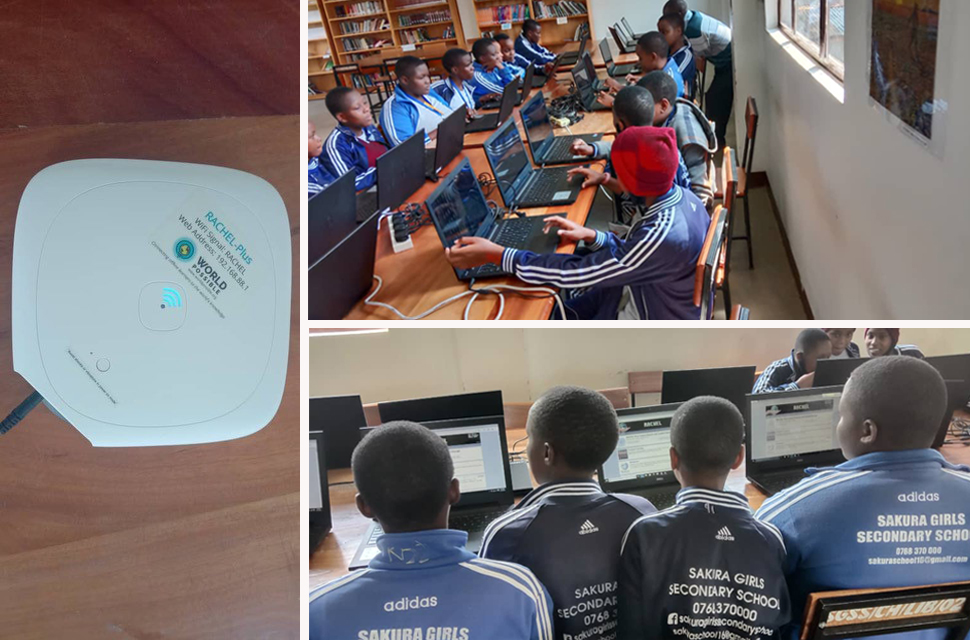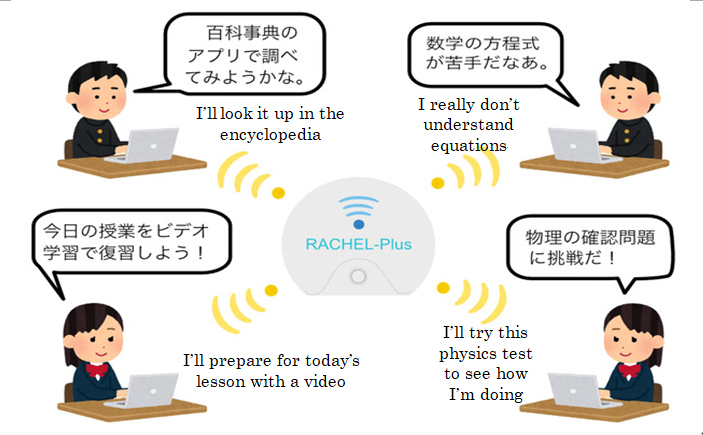29th JAMCO Online International Symposium
February 2021 - March 2021
The Potential of Broadcasting and New Media for Supporting Education During the Coronavirus Pandemic
New Initiatives at the Sakura Girls Secondary School in 2020
1st September, 2020
OutlineThe Sakura Girls Secondary School is a lower secondary boarding school for 200 girl pupils located in a village of the Arusha Region in the foothills of Kilimanjaro and opened with assistance from the Japanese government, corporations and others in January, 2016. It is still common for girls in many African countries only to finish pri-mary school and then marry in their early teens, and this has been identified as a fac-tor in the perpetuation of poverty. The school seeks to break the cycle of poverty by nurturing creative female leaders who will be proficient in the fields of science and mathematics.
The school makes regular classroom use of programs made for educational broadcast. 623 such programs in the keeping of JAMCO and NHK International have been transferred to the school so far under assistance provided by the Hoso Bunka Foundation. A survey conducted last year on the use of these programs and pupils’ and teachers’ opinions and impressions of them has shed further light on the importance of ICT-use in learning.
In 2020, the school’s fifth year of operation, Tanzanian schools had to be closed for over 3 months due to the COVID-19 pandemic, only fully reopening from the start of July. Japanese staff, however, still cannot return to their posts in Tanzania, and the situation in Tanzania remains unpredictable. The maximum possible assistance and teaching is being provided under these circumstances through a continuing process of trial and error.
1. Measures Taken at the Sakura Girls Secondary School during the COVID-19 Pan-demic
Background
All schools and colleges (kindergartens, primary and secondary schools, universities, vocational colleges etc.) in Tanzania were closed from March 17th after coronavirus cases were confirmed in the country. Universities and upper secondary schools reopened on June 1st, and primary and lower secondary schools on June 29th.
Much uncertainty remains, however, about the state of the state of the pan-demic in Tanzania, including the total number of cases, and very little information about this reaches Japan. Further, it has been reported that many in the local popula-tion accept the presidential statement that Tanzania has defeated the novel corona-virus, and almost nobody wears masks about town. (Information received from foreign residents of Tanzania)
Under these circumstances, with the aim of providing the maximum possible assistance on the ground in close coordination with local staff and others, the measures outlined below have been implemented under the auspices of the support provided by Group Kilimanjaro.
Purposes
The goals are to provide a safe learning environment for pupils, secure learning opportunities, and ensure a safe working environment for staff (teachers, cleaners, kitchen staff, dormitory supervisors, administrators etc.) at the Sakura Girls Second-ary School under the special circumstances of the COVID-19 pandemic.
Methods
- The purchase of masks, soap and medical thermometers for use by pupils and staff, and instruction in their proper use to prevent transmission of the novel coronavirus.
- An e-mail attachment sent to the persons concerned at the Sakura Girls Secondary School containing sections that could feasibly be applied to the Tanzanian case from the manual for schools published on the Japanese Ministry of Education, Cul-ture, Sports, Science and Technology website. (Manual of Sanitary Practices for Schools Relating to Transmission of the Novel Coronavirus: The New Normal for Schools)
Achievements (Current State of Implementation)
- Distribution of Masks to all Pupils
Mask use has not yet become sufficiently rigorous, perhaps because Tanzania had no prior custom of using masks. - Placement of liquid soap at entrances to school buildings together with water tanks fitted with faucets
The soap is being used for thorough handwashing. The habit of washing hands before and after meals was already well-established and the handwashing is performed with rigor. (Interestingly, soap produced in science classes is being used. The science teachers have seized this “active learning” opportunity.) - Purchase and Use of Medical Thermometers
Almost all staff live off campus and commute to the school on buses and other modes of public transport. Their temperature is taken at the school gate each morning. All visitors to the school must also have their temperature taken.

Background
The Sakura Girls Secondary School’s national examination results have risen year by year since its opening, reflecting the school’s rising academic performance. The school now places consistently well in the academic rankings of the Arusha Region and has come to be regarded as a school that provides pupils with a good grounding for ad-vancement to further education. (In the 2019 school year, 4th year pupils at the school ranked 11th out of 46 in the national examinations in the Arusha Region. In mock test results, the 2nd year pupils came top in the region.)
In spite of these high overall test scores, however, the school’s scores in science and mathematics have been relatively weak. The cooperation of JICA and the school’s various other supporters has provided sufficient experimental equipment, and this is being put to good use, but further teaching support is still required.
Accordingly, an ICT learning system has now been introduced for use in class, private study, and also by teachers in lesson preparation, with the aim of reinforcing science and mathematics education in the school.

Photos: Using RACHEL-Plus in class
The Introduction of RACHEL-Plus
World Possible, a U.S. group based in California, developed the original version of RACHEL-Plus in 2009 with the aim of providing equal educational opportunities even in remote areas of Africa and elsewhere. RACHEL-Plus is a portable server containing video teaching materials, encyclopedia functions, tests and other educational data. Users can access this data freely by connecting their personal computers to its wireless network. The system is expected to be of great educational use in regions where the estimated 53% of the world’s population that still enjoys no internet environment lives.
Further information about the system can be viewed on the World Possible
website at:https://worldpossible.org
How RACHEL-Plus Works

Purposes
Introduction of the ICT learning system is expected to support pupils’ learning in all fields, not limited to science and mathematics, and raise their academic performance.
Methods
The RACHEL-Plus ICT learning system was introduced on an experimental basis in July, 2020 for use in both class and private study. The system is connected to personal computers by wireless network in the classroom, and can be accessed both inside and outside class. Teachers are also being encouraged to use it in lesson preparation.
* RACHEL-Plus is an ICT learning system for use on personal computers connected to a classroom network. Even without connecting to the internet, pupils can use RACHEL-Plus to view educational videos made in standard formats, tackle practice problems, and research Wikipedia and other learning content.
Achievements (Current State of Implementation)
Classes using RACHEL-Plus are presently being provided once a week. The students’ positive reactions to this system include the following:
- The content and different examples do help to make things clearer.
- The explanations are really simple and easy to grasp.
- RACHEL-Plus has made things I couldn’t follow in class very clear to me now.
- I’d like this to be something I can access easily whenever I need it, like a textbook.
- I want to be able to use this in personal computer classes and in the library.
Judging from the pupils’ response, RACHEL-Plus does appear to have provid-ed further learning opportunities.
Prospects
Full reports have not yet been received from the school because the project is still in its very early stages but the teachers’ comments include the following:
- The pupils understand quickly because even difficult content is explained simply and well.
- Results have even been evident in subjects where pupils typically struggle, such as meiosis.
It is hoped the system might become widely used in Tanzanian schools once its successes have been identified and further improvements made.

Photographs: Buildings and pupils of the Sakura Lower Secondary School
Obumi FURUYA, Chairperson
Group Kilimanjaro Inc
 Return to 29th JAMCO Online International Symposium contents page
Return to 29th JAMCO Online International Symposium contents page








